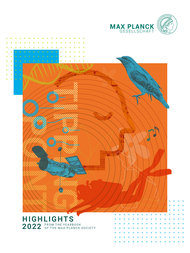Max Planck Society Yearbook Highlights
Each year, the Max Planck Society submits a scientific research report in the form of a yearbook to render account of the scientific research performed at its Institutes to the public and its funding providers. The central questions addressed are: where do we stand, and where do we want to go? The Max Planck Institutes are asked to select a work or project from their scientific activities that is suitable for presentation in the yearbook, as far as these have reached a certain degree of completion. The yearbook contributions of all Max Planck Institutes are published on the website.
For this printed collection, 15 articles were selected and edited in a journalistic manner, which seemed particularly suited for publication from a science communication perspective and especially interesting also for non-experts. The highlights of the 2022 Yearbook showcase the wide range of scientific endeavours pursued by the Max Planck Society, covering fields such as materials science, biochemistry, and automated decision-making.
At the Max Planck Institute of Colloids and Interfaces, researchers are focused on transforming biogenic materials, previously considered waste products of the timber industry, into valuable applications. For instance, tree bark can be processed into a flexible, leather-like material suitable for clothing. These sustainable raw materials contribute to resource conservation and help reduce CO2 emissions.
A team from the Max Planck Institute of Biochemistry has developed an innovative approach called "Deep Visual Proteomics" for cancer diagnosis. By analysing a tissue sample from a tumour, researchers can determine the complete set of proteins involved in its progression with minimal effort. This enables rapid and targeted treatment strategies based on a comprehensive understanding of the tumour’s molecular composition.
Researchers at the Max Planck Institute for Innovation and Competition are studying the impact of human interaction with technology-powered agents. Understanding how human behaviour changes in such interactions is crucial for establishing legal and political frameworks to regulate automation effectively.




